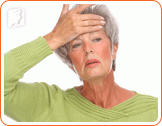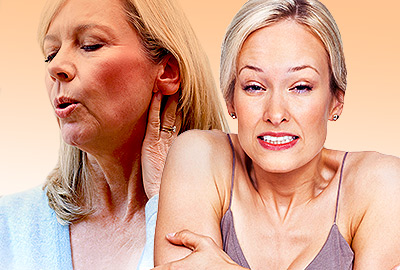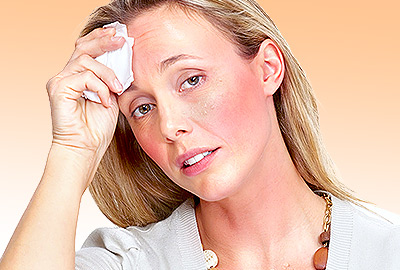Hot flashes, a common symptom of menopause, are believed to affect as much as 70% of American women before and during menopause. While menopausal hot flashes can be inconvenient, uncomfortable, and even embarrassing for women, they are by no means a life sentence. Women have many options for combating hot flashes and preventing them from disrupting daily life. Read below to learn more about hot flashes and the strategies many women use to manage them.
About Menopausal Hot Flashes
Menopausal hot flashes are characterized by an intense flooding of heat that usually dissipates within seconds. Common symptoms include:

- Flushed skin, especially the head and neck
- Sudden, fever-like heat
- Profuse sweating
- Irregular heart rate
- Chills
Of course, each woman experiences hot flashes differently, but most report at least one of the symptoms mentioned above.
Hot flashes are caused by hormonal fluctuations that occur during menopause. More specifically, dips in the hormone estrogen can cause the hypothalamus region of the brain - which is responsible for regulating body temperature - to act erratically, causing brief spikes in temperature.
Managing Menopausal Hot Flashes
There are a variety of simple things women can do to combat uncomfortable hot flashes. These well-tested strategies can mean the difference between a normal day and one full of frustration and discomfort.
Cool Clothing
Try wearing clothing made of natural, breathable materials such as cotton and linen in order to stay as cool as possible.
Open Atmosphere
If you're at home, an easy way to help reduce hot flashes is to keep rooms open and cool by turning on a fan . During the winter months, carrying a personal fan can be effective.
Refreshing Beverages

Although nobody needs an excuse to enjoy a refreshment, keeping the body hydrated with chilled drinks can help prevent hot flashes.
More Information
Women can use these strategies or develop their own to fit their unique lifestyles. However, sometimes these strategies are not enough, and women may need to seek slightly more powerful measures to manage hot flash episodes. The following types of treatments have been shown to greatly assist women:
- Alternative medicine
- Prescription medications
Explore the links below and discuss your options with a trusted doctor before making a decision about treatments for hot flashes.
Sources
- "Hot flashes ... in January". Canadian Medical Association Journal. 2004: 170 (1).
- Miller, Heather and Rose Maria Li, M.D. "Measuring Hot Flashes: Summary of a National Institutes of Health Workshop". Conference report. Mayo Clinic. June 2004: 79.
- Sikon, Andrea and Holly Thacker M.D. "Treatment for Menopausal Hot Flashes". Cleveland Clinic Journal of Medicine. July 2004: 71 (7).



